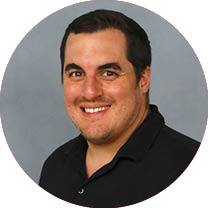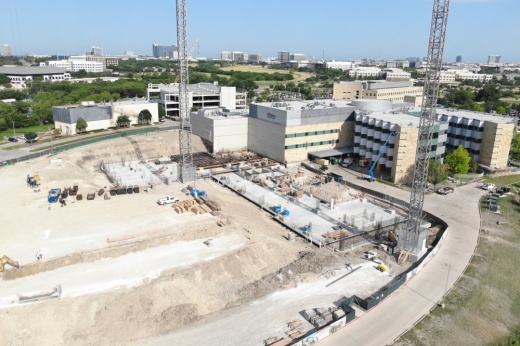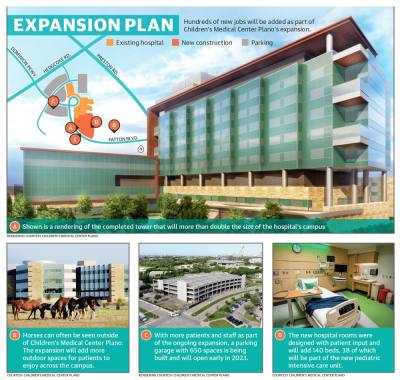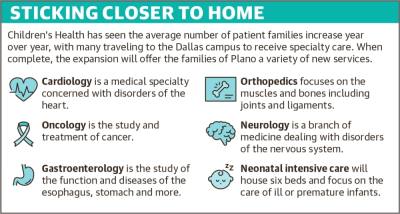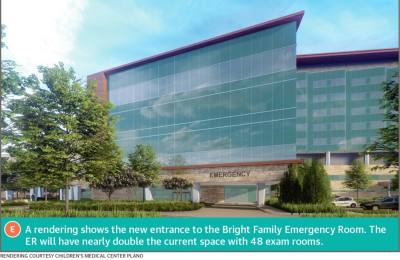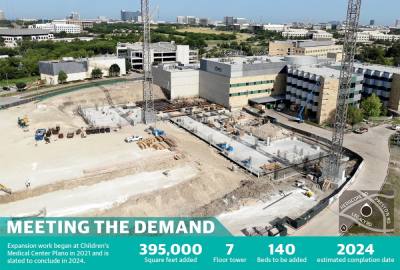The pediatric care center is in the process of building a 395,000-square-foot tower with 140 new patient beds. That will bring the hospital’s total to 212 patient beds, according to a Children’s Health release. The hospital will also add a new larger emergency room with 48 exam rooms and increased services. The hospital will also add 26 new pediatric intensive care unit beds, with six beds for newborn intensive care. The expansion will come with enhanced hospital amenities, new outdoor spaces and a 650-car parking garage, according to the release.
The Children’s Health system first announced the expansion in 2020, and it is set to be completed by the end of 2024.
Children’s Health first opened Children’s Medical Center Plano in 2008. Vanessa Walls, northern market president of Children’s Health, said hospital officials first identified the need to expand the Plano campus more than three years ago as population numbers in the city and its surrounding areas began climbing rapidly.
“[Residents] wanted their care to be here in [Plano],” Walls said. “So as we forecasted that [population growth], we realized that we had to have some pretty significant expansion plans.”
In 2021, Children’s Medical Center reported 168,000 patient visits and 51,000 emergency room visits in Plano. Walls said the number of patients coming to the hospital has grown consistently year over year since it first opened, and that is likely to continue moving forward.
Plano Mayor John Muns said the hospital’s importance to the city and the region cannot be understated.
“When you think about all the growth here, the needs are just unbelievable,” Muns said. “For [Children’s Health] to make such a big jump to meet it and to have a pediatric hospital at that level is such an asset.”
Increasing service
As part of the expansion, Walls said the Plano hospital will look to add a number of staff positions to meet the increased capacity once the new tower officially opens. Walls said the hospital has about 900 employees, and it will likely see that number increase closer to 1,500 over the next few years.
According to Children’s Health officials, a goal of the expansion is to get the Plano hospital certified as a Level II trauma center. The hospital was given its Level IV rating in 2018 and is offering Level III services.
According to the American Trauma Society, a Level IV center primarily acts as a diagnosis and screening facility before transferring patients to a higher-level trauma center. A Level III rating means it can provide resuscitation, surgery, intensive care and stabilization of injured patients, and a Level II trauma center can provide nearly all the care required for injured or sick patients.
Dr. Brad Tate, the Plano hospital’s chief medical officer, said some patients are sent from the Plano campus to the Children’s Dallas hospital to receive treatment. He said the experience of being transferred to another hospital can be logistically and, at times, emotionally difficult for patients and families.
“It’s not as simple as putting [the patient] in an ambulance and going,” Tate said. “If we can care for that family here in the community we live in ... that’s the best experience possible.”
To prepare for the expansion, Tate said the hospital’s staff built a mock patient unit out of Styrofoam that closely resembles the layout of parts of the new building to run through treatment scenarios. He said the goal for his staff is to hit the ground running when the tower opens in 2024.
Caring for children
Jennifer Roady, manager of the hospital’s family support services department, said Children’s Health is committed to helping families feel comfortable in a hospital setting.
“We know the hospital can be scary,” she said. “We are able to tailor our care to that child’s and family’s needs.”
Tate said treating children can present challenges, but it is also uniquely rewarding.
“Kids have such a baseline resilience of wanting to get better,” Tate said. “I get to treat not only the kid ... but I look at it as treating that whole family unit.”
Roady said programs such as animal therapy services, which allows trained dogs to visit patients or time outside enjoying the amenities of the campus grounds, help ease the stress for children in a medical setting.
She said the hospital is also using virtual reality technology so patients and families can go into an MRI machine or see a procedure acted out before experiencing it in reality.
“What I truly love about [Children’s Health] is our mission is to make life better for our patients but also the people that love them,” Roady said. “Whether it’s the care that we are providing medically and those extra moments that we provide for families, we want to make sure that children are taken care of.”


